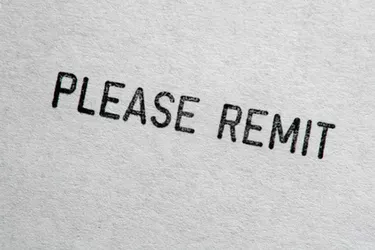
Debts become delinquent when a consumer neglects to make previously agreed upon payments to a lender. Delinquent debts often carry high fees and can result in unpleasant telephone calls from debt collectors and legal difficulties. It also can hurt an individual's chances of obtaining future credit cards and loans by damaging his credit rating.
Facts
Video of the Day
According to the U.S. Department of the Treasury's Financial Management Service, failing to make a timely payment on a debt doesn't mean that the debt becomes delinquent immediately. Some lenders provide a grace period over which the debtor may make his payment late without suffering a penalty. Grace periods vary depending on the lender. Once the grace period expires, however, the lender will categorize the debt as delinquent. If a consumer owes a delinquent debt, he will continue to owe it even if the original lender transfers or sells the debt to another company. Until an individual pays off his delinquent debt, fees can continue to accrue.
Video of the Day
Time Frame
Most companies will hold a delinquent debt for six months before assigning the balance to a collection agency. This gives the debtor ample opportunity to either remember her forgotten payment or recover from any minor financial setbacks that caused her to forego paying her creditors. Lenders may either assign delinquent debts to a collection agency and pay the company a fee for its services or sell accounts to collection agencies. Keeping a debt for the first six months of a delinquency ensures that the lender has the greatest chance of recovering the full amount before sharing the profits with a third party.
Significance
Lenders often report delinquent debts to the credit reporting agencies. The consumer's credit report then reflects his unpaid financial obligations. This, in turn, impacts his credit score. The longer the individual procrastinates in paying the debt, the worse his credit score becomes. The delinquent debt can continue to cause credit damage even if it no longer belongs to the original lender. Collection agencies also submit periodic reports to the credit reporting agencies, and a collection account is always a negative entry on a consumer's credit report.
Effects
When an individual's account with her lender falls into delinquency, the lender will immediately initiate collection activity through frequent letters and phone calls to the consumer. Collection agencies also use these methods when collecting unpaid debts. If the individual does not respond to a lender or collection agency's efforts by making a payment, either company may sue for the balance. In some states, successfully suing a debtor over a delinquent debt allows the lender or collection agency access to remedies such as wage garnishment and bank account levies.
Considerations
If an individual cannot afford to repay his delinquent debt for even a short period of time, high interest charges and fees can leave him owing an inordinately high balance. Credit counseling is one method by which individuals can lower fees and make affordable payments until the balance is paid in full. A debtor may also request that the lender or collection agency agree to a debt settlement. This allows him to pay only a portion of the amount he owes while absolving his obligation to pay the delinquent debt.